SDG3.3.5 Mental health support
NCUE has been striving to provide free mental health support for students, faculty, and staff for a long time. In addition to setting up a first-level unit student psychological counseling center, NCUE has also pioneered a community psychological counseling and potential development center that serves the community members. We integrate the professional resources of the school’s Counseling and Consultation Department and establish referral and cooperative relations with community units (including hospitals, courts, and social and political units). We also provide psychological counseling services for students, faculty, and staff, as well as community members, and practical training and supervision for professional psychological counselors.
1. Student psychological counseling:
NCUE employs developmental, interventional, and circumstantial preventive counseling measures. We include systematic cooperation, as well as departmental/college consultation to implement three-level preventive counseling on campus. The preventive counseling at all levels is as follows:
1.1 Developmental counseling: Orientation counseling, life education counseling, gender equality education counseling, career counseling, study counseling, counseling for foreign students, stress adjustment, class counseling, college and departmental counseling, peer counseling, school companion tutoring, mental health promotion by instructors, etc.
1.1.1 New Student Class Counselling:Due to the epidemic prevention policy enacted in 2021, students had much less time to interact with other people before and after the start of the semester, which also affected their chances to build peer relationships. Therefore, in the new semester, the counseling program designed for freshmen focuses on responding to interpersonal interactions and conflicts, helping them to understand the situations and dilemmas involved. Through interesting activities, students are engaged in conflict scenarios and learn strategies for dealing with conflicts. Each session takes two hours, and the program lasts two weeks. A total of 28 freshmen classes have joined the program, and 100% of the classes completed the training. A total of 589 students participated, with an attendance rate of 45%.
1.1.2 International Student System Cooperation: In 2021, we recorded 98 cross-unit consultations on the topic of international, overseas, and terrestrial students.
|
Name of activity |
Lecturer |
Date and time |
Location |
Number of participants |
Satisfaction |
|
Orientation counseling for international freshmen, 2021 academic year |
Wen-Ling Nien, counseling psychologist Rou-An Jiang, counseling psychologist trainee |
2021/11/1 (Mon) 17:00–19:30 |
Comprehensive Center B1 Creative Workshop |
41 |
4.28 |
|
Listening to You, Telling My Story - about Interpersonal Relationships |
Yu-Chun Liu, counseling psychologist |
2021/10/15 (Fri) 15:00–17:00 |
Comprehensive Center Group counseling room on the 4th floor |
19 |
4.5 |
|
When Emotions Knock on the Door, Should We Welcome Them or Turn Them Back? About Emotional Self-Care |
Cheng-Jing Li, counseling psychologist |
2021/10/29 (Fri) 16:00–18:00 |
Comprehensive Center Group counseling room on the 4th floor |
18 |
4.57 |
|
From Me to Us - Practices on Our Relationship |
Sih-Ci Jhu, counseling psychologist |
2021/11/29 (Mon) 16:00–18:00 |
Comprehensive Center Group counseling room on the 4th floor |
20 |
4.22 |
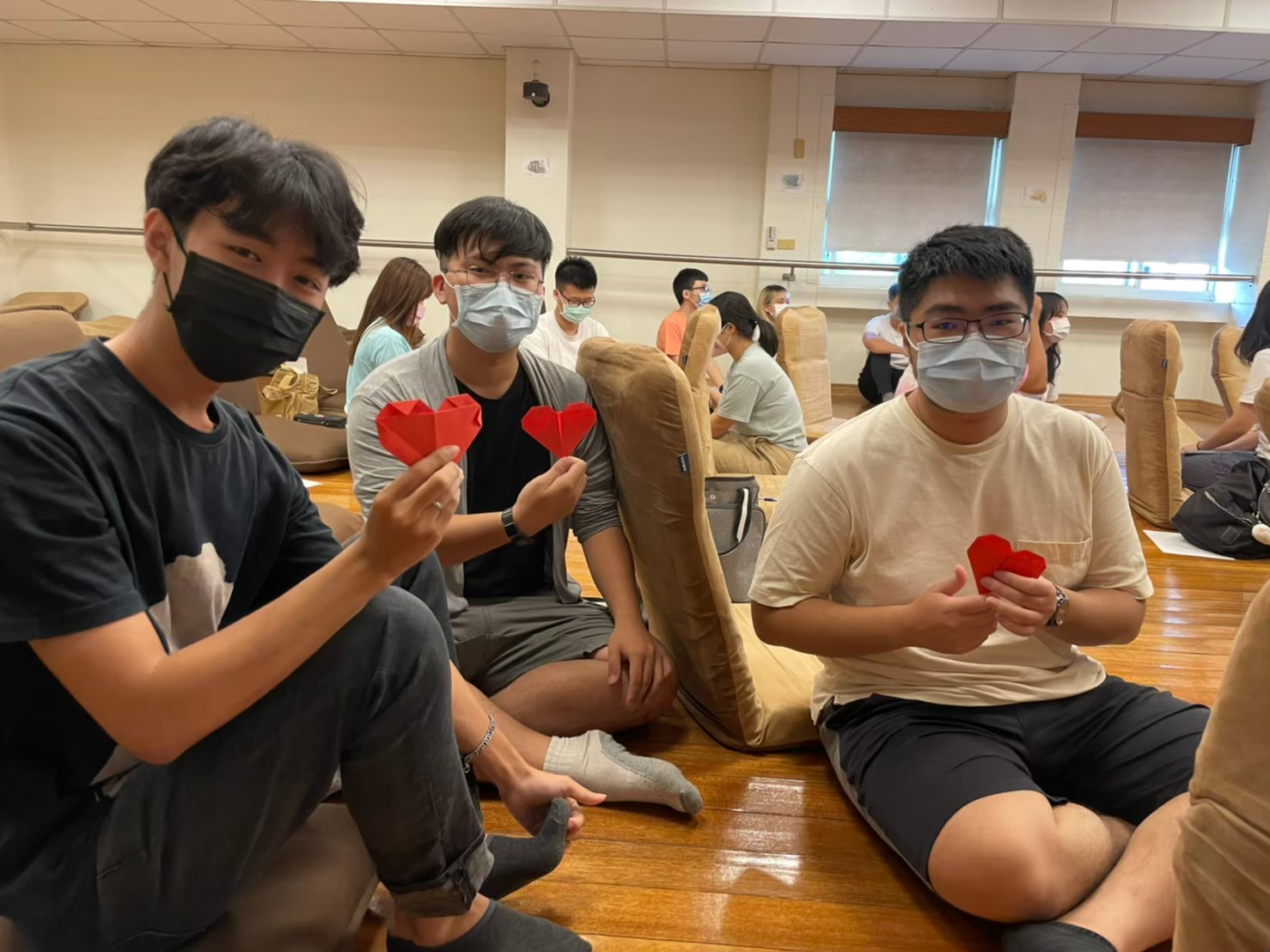
Listening to You, Telling My Story - About Interpersonal Relationships
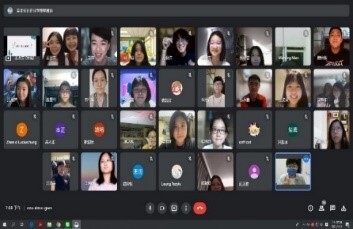
Orientation for international freshmen
1.1.3 Group consultation activities: A total of 5 group activities were held. The total number of participants was 30, the number of participants was 230, and the satisfaction score was 4.78.
|
Theme of group counseling |
Leader |
Date and time |
Number of participants |
Number of participants (person-times) |
Total sessions of the group counseling |
Satisfaction |
|
Lovebirds in Conflicts-Growth Group of Love |
Rou-An Jiang counseling psychologist trainee |
2021/10/13–10/08 Every Wednesday 16: 00–18: 00 |
6 |
44 |
8 |
4.9 |
|
The story of Me.Family-Exploration Group Counseling on Family Relationships |
Yi-Ting Jiang counseling psychologist trainee Peng-Zao Chen counseling psychologist trainee |
2021/10/21–12/16 Every Thursday 16: 00–18: 00 |
8 |
63 |
8 |
4.6 |
|
Stories of Heterosexuality and Homosexuality: Life Narrative Group on Sexual Orientation Identity |
Yu-Chia Liu counseling psychologist trainee Yi-Chao Wang counseling psychologist trainee |
2021/10/21–12/16 Every Thursday 16: 00–18: 00 |
6 |
49 |
10 |
4.8 |
|
Stop Hitting the Mental Dead-ends Together –Exploration Group Counseling on Interpersonal Relationships |
Yi-Chao Wang counseling psychologist trainee Ming-Ying Hsieh counseling psychologist trainee |
2021/10/26–12/21 Every Tuesday 16: 00–18: 00 |
4 |
32 |
8 |
4.8 |
|
Between You and Me, The Unspoken Words – Exploration Group Counseling on Interpersonal Relationships |
Peng-Zao Chen counseling psychologist trainee Yi-Ting Jiang counseling psychologist trainee |
2021/10/26–12/21 Every Tuesday 16: 00–18: 00 |
6 |
42 |
8 |
4.8 |
|
Total |
30 |
230 participants (person-times) |
42 sessions |
4.78 |
||
1.1.4 Career Guidance Series Activities: In 2020, a career lecture was held, with a total of 53 people participating; in the 2021 academic year, a career talk was held, and Shou-Cian Kong, a counseling psychologist, was invited to share on the topic of “Career Exploration – The Slash Life of A Generation of Postponed Maturity”; 16 people participated, and the satisfaction score was 4.53.
1.1.5 Series of learning and guidance activities: In the 2021 academic year, a career talk was held, and Yu-Ting Huang, a counseling psychologist, was invited to give a talk titled “Improve Your Learning with Psychology!” Sixteen people participated, and the satisfaction score was 4.62; In 202, a learning and guidance lecture was held, with a total of 23 people participating.
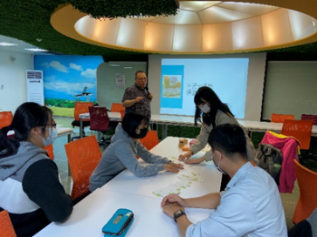
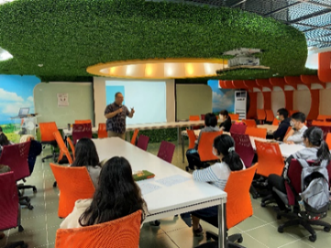
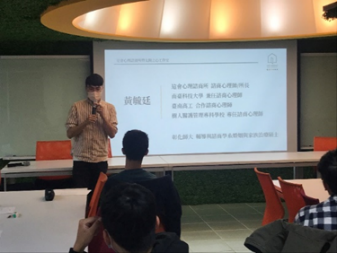
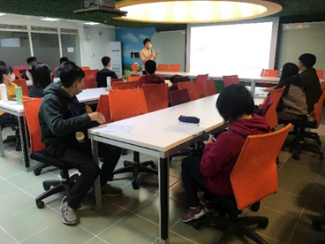
1.1.6 International Student Counselling Series Activities: We held international student counseling activities in the form of lectures and workshops.
1.2 Interventional counseling work: individual counseling, psychological testing and interpretation, individual stress testing, high-care student tracking and case management, early warning student counseling and tracking care, mental health counseling, referral, and counseling mechanisms for disadvantaged students, etc.
1.2.1 Individual counseling interviews (including individual counseling, individual psychological test administration and interpretation): This semester starts from 1 August 2021 and ends on 31 January 2022 (six months), with a total of 28 weeks. The actual number of weeks in class is 18 weeks. Within this period, the center accepted 380 individuals for meetings and conducted 2,417 meetings. The following are statistics on the people who applied for individual counseling at the center from the 2015 academic year to the first semester of the 2021 academic year: (Unit: people/person-time)
|
Semester |
First semester |
Second semester |
||
|
Academic year |
Number of applicants |
Number of clients (person-times) |
Number of applicants |
Number of clients (person-times) |
|
2016/8/1–2017/7/31 |
312 |
1,718 |
257 |
1,834 |
|
2017/8/1–2018/7/31 |
282 |
1,840 |
335 |
2,016 |
|
2018/8/1–2019/7/31 |
361 |
2,391 |
376 |
2,161 |
|
2019/8/1–2021/7/31 |
303 |
2,142 |
311 |
1,877 |
|
2020/8/1–2021/7/31 |
353 |
2,643 |
236 |
2,031 |
|
2021/8/1–2022/7/31 |
380 |
2,417 |
|
|
The total satisfaction score for the individual counseling service in the last semester of the 2021 academic year was 4.53 (122 feedback questionnaires were recovered; a 5-point scale was used in the feedback questionnaires).
1.2.2 Special case management: The ‘case management system’ will continue to be adopted. The case management system aims to provide comprehensive help to students with special conditions reported by teachers, instructors, classmates, military instructors, or fellow students. The students will receive help in dealing with crises or difficulties in adaptation. Resource integration and the use of counseling and medication will help the student’s life quickly return to normal. The number of special case services for new referrals and continuous students this semester, along with the statistics of the past 8 years, is as follows:
|
Semester Semester |
New cases |
Tracked cases (A) |
Closed cases (B) |
Total number of cases (A+B) |
|
2013/8/1–2014/7/31 |
36 |
94 |
26 |
120 |
|
2014/8/1–2015/7/31 |
55 |
105 |
44 |
149 |
|
2015/8/1–2016/7/31 |
62 |
107 |
56 |
163 |
|
2016/8/1–2017/7/31 |
89 |
98 |
103 |
201 |
|
2017/8/1–2018/7/31 |
113 |
168 |
71 |
239 |
|
2018/8/1–2019/7/31 |
91 |
212 |
44 |
256 |
|
2019/8/1–2020/7/31 |
65 |
192 |
48 |
240 |
|
2020/8/1–2021/7/31 |
81 |
207 |
63 |
270 |
|
2021/8/1–2022/7/31 |
38 |
122 |
7 |
129 |
1.2.3 From the student transfer counseling and service notification system of the Ministry of Education, we accepted 11 cases. They have been handed over to the psychiatrist of each department responsible for assistance. In addition, 9 meetings were held in accordance with the school’s student transfer counseling and service methods and the school’s related operating procedures. According to the resolution of the evaluation meetings, 2 case was reported, and a chief counselor was authorized for the case. If any other student is withdrawing from school, a report shall be made.
1.2.4 Tracking Early Warning Student Counselling:
With the help of the NCUE’s early warning system for academic affairs, we take the initiative in tracking and caring for students through phone calls, letters, and interviews; we evaluate their adaptation to their studies, assist in the preliminary identification of problems, and offer advice. If the students are assessed to have other needs, they will be invited to the counseling center for individual counseling, while teachers, psychologists in various departments, and the staff of the International Office will be invited to cooperate systematically in a timely manner to help students get back on track as soon as possible. In 2021, situations involving 45 people were tracked, and 92 person-times were served.
1.3 Circumstantial counseling: Crisis management, psychiatric consultation, transfer counseling, high-care case follow-up counseling, report case handling. In 2021, the center provided psychiatric consultation to 21 person-times, offered transition guidance to 11 person-times, referred seven person-times for further help, and tracked and guided 266 person-times of high-care cases.
2. Faculty and staff psychological consultation:
2.1 NCUE conducts psychological counseling service activities every year as part of its assistance programs aimed at protecting the mental health of faculty members and staff. A feedback form is designed to collect the opinions of applicants, which serves as a basis for deciding how to improve and whether to hold the activities again.
2.2The school’s Community Psychological Counseling and Potential Development Center is responsible for providing employees with free mental health support. The Center and the personnel room handle the mental health service plan for the school’s faculty and staff together and assist in the organization and construction of secondary prevention work for the mental health of the staff. Free psychological consultations, groups, speeches, and other resources can promote the knowledge of the people in the organization to improve their mental health, helping them focus on their duties during working hours and thus improving work efficiency. In 2020-2021, this program provided 280 psychological counseling services, and a total of 34 colleagues sought assistance.
|
Year |
Number of people receiving psychological counseling services (person-times) |
Colleagues seeking help |
|
2020 |
166 |
16 |
|
2021 |
114 |
18 |
|
Total |
280 |
34 |
2.3. Professional psychological counseling service:
2.3.1 Individual psychological consultation
2.3.2 Marriage and family consultation
2.3.3 Game and therapy
2.3.4 Group psychological consultation
2.3.5 Psychological assessment
2.3.6 Professional counselor supervision
2.3.7 Referral
2.3.8 Parental counseling, internet addiction parental counseling

